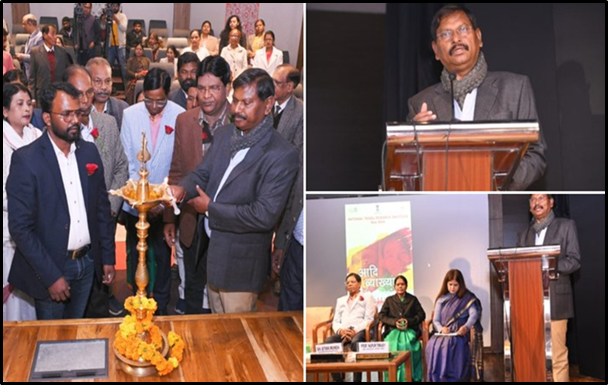Adi Vyakhyan
News
- A two-day tribal orientation program called Adi Vyakhyan was launched in New Delhi by Union Minister for Tribal Affairs Arjun Munda.
- The National Tribal Research Institute (NTRI) is the organization behind the program, which aims to investigate the obstacles to tribal existence and gain a deeper understanding of the intricacies of tribal traditions and culture.
- This project aims to investigate tribal identity and the ways in which tribes have influenced the cultural diversity of the country.
- The minister’s speech on the occasion focused on tribal identity, acknowledging and protecting it.
- He said that maintaining tribal identity depends on the language and literature of the tribe.
- He also emphasized the government’s efforts on behalf of the Particularly Vulnerable Tribal Group (PVTG), notably the initiative for the upliftment of tribal people known as PM-JANMAN (Pradhan Mantri Janjati Adivasi Nyaya Maha Abhiyan).
- The Union Minister also praised Adi Manthan for advancing the conversation on the Prevention of SC/STs Atrocities Act of 1989, the Forest Rights Act (FRA) of 2006, and the Panchayats (Extension of Scheduled Areas) (PESA) Act of 1996.
- Through the Adi Vyakhyan program, tribal communities will become acquainted with Indian statistical data as well as constitutional protections.
- It is anticipated to pave the way for a deeper comprehension of tribal people and offer insightful information about the legal frameworks that influence tribal governance and land rights.
| PM – JANMAN
● It is a government program that aims to integrate tribal communities into society. ● The Ministry of Tribal Affairs will carry out the program (which consists of Central Sector and Centrally Sponsored Schemes) in coordination with the State governments and the PVTG communities. ● The plan will focus on 11 crucial interventions that will be managed by nine line Ministries, guaranteeing that the programs that are currently in place are implemented in the villages where PVTGs reside. ● It includes a number of areas, such as opportunities for sustainable livelihoods, access to clean drinking water, better healthcare, education, and nutrition, as well as safe housing under the PM-AWAS Scheme and improved road and telecommunications connectivity. ● The plan also calls for the construction of solar street lights, off-grid solar power systems for one lakh households, and Van Dhan Vikas Kendras for the trading of forest produce. ● By addressing the various and intersecting forms of discrimination and exclusion that the PVTGs experience, as well as by acknowledging and appreciating their special and significant contribution to both national and international development, the program is anticipated to improve the quality of life and overall well-being of the group. PVTGs ● In India, 8.6% of the population is comprised of tribal people. ● Among the tribal groups, PVTGs are more at risk. ● PVTGs require additional funding for their development because more established and assertive tribal groups receive a larger share of tribal development funds as a result of this factor. ● Primitive Tribal Groups (PTGs), the least developed of the tribal groups, were established as a distinct category by the Dhebar Commission in 1973. ● The Indian government renamed the PTGs as PVTGs in 2006. ● In this regard, the Indian government began identifying the most vulnerable tribal groups in 1975 and designated 52 of them as PVTGs. In 1993, 23 more groups were added to the category, bringing the total number of PVTGs out of the 705 Scheduled Tribes to 75. ● PVTGs share a number of fundamental traits, such as being largely homogeneous, having a small population, being physically isolated, not having written language, having relatively simple technology, changing at a slower pace, etc. ● Odisha has the highest number of PVTGs out of the 75 listed. |
Source: Newsonair
Disclaimer: All efforts have been made to represent India accurately and as per India government. However, Universal School of Administration, Bengaluru and its associated people do not own any responsibility for the correctness or authenticity of the same. Please notify on the email: [email protected] if any inconsistency is found for the factual correctness.




